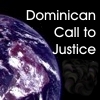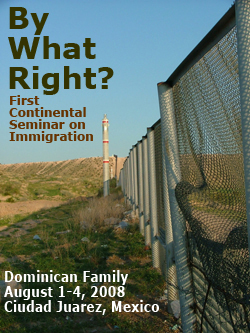 |
INTRODUCTION On August 1-4, 2008, the First Continental Seminar of Justice and Peace on the problems of our migrant brothers and sisters took place in the Casa del Migrante, which is under the care of the Province of Santiago de Mexico of the Order of Preachers (Dominicans) in Ciudad Juarez, Chihuahua Mexico. Forty-two Dominican sisters from sixteen congregations, twenty friars from six provinces and six Dominican laity, representing twelve countries: Argentina, Brazil, Colombia, Costa Rica, Chile, Honduras, Italy, United States, Mexico, Peru, Puerto Rico and the Dominican Republic. The objectives of the seminar were to strengthen mutual understanding, sister and brotherhood and solidarity among Dominicans of North and South America working on Justice and Peace, especially in pastoral and social service among immigrants; conduct and analyze the political, economic, social and ecclesial situation on the continent regarding immigration; and elaborate a strategic plan for short, medium and long range action so that Dominicans from North and South America are in solidarity with people forced to migrate in order to survive personally and as families. For this reason the seminar followed the pastoral methodology of see, judge and act from the Church of Latin America and the Caribbean.
After having worked in mixed groups of sisters and friars, representatives of the different countries participating in the seminar, and in plenary sessions, and after having shared rich experiences of the pastoral work of the Dominican Family with migrants on the continent, and after having listened and dialogued with specialists in human sciences, theology, and pastoral work on the theme in question, it was decided to issue the following declaration, with the purpose of distributing it to the whole Order, the wider society, public opinion and to different entities of ecclesial and political decision making at national and international levels.
Migratory Patterns and Their Causes During the 20th century, the patterns of international migration changed substantially. From the 19th century until World War II, international migration consisted predominantly of masses of people traveling from Europe to the United States and Latin America. In the mid twentieth century, massive internal migrations also occurred in the Americas as people from rural areas flocked to cities in response to modernization and industrialization as well as to the systematic neglect of land reform and the needs of small farmers. In the 1970s, international migrations within Latin America and from Latin America to the United States, spurred by military dictatorships in various countries, increased dramatically. Nevertheless, it was the introduction and dominance of the neo-liberal economic model among governments, international financial institutions as well as multinational corporations in the 1980s, which severely aggravated poverty and consequently migration in and from Latin America and other regions of the world. This economic model resulted in the dismantling of national economic development projects, the imposition of programs of macro economic structural adjustments that indebted governments and impoverished their people, the privatization of state owned enterprises that deprived countries of vital income for public investment (especially in the social area) and opened domestic commercial markets to unfair international trade practices, sanctioned by so-called free trade agreements. In addition, the violence born out of the poverty resulting from a failed economic model as well as the dramatic increase of drug trafficking that caused even more people to flee their homes in search of personal security and a better life. Internal and international migration became the distinctive characteristic of the time. In the face of all this forced migration of hundreds of thousands of people, we cannot remain indifferent. Migrants Forced To Leave Their Homelands These migrations undermined the social and productive fabric of
society, resulting in millions of Latin Americans traveling abroad
to find what was denied them and their families in their homelands:
the opportunity to find meaningful work and live a dignified life. Families
were (and continue to be) increasingly divided and torn apart,
as wage earners left home to find a way to support family members
left behind. Their plan was to earn enough money to be able
to return home, be reunited with their families and undertake productive
employment. This dream was hardly realized. Eventually,
the desperation throughout much of Latin America became so severe
that whole extended families migrated, turning small towns into
wastelands for limited numbers of elderly. Families now came
to understand that their migration was more than likely not going
to be temporary but permanent. And at home, depopulation
came to characterize many communities and whole areas. The Suffering Migrants Encounter Since the 1980s, the extreme hardships experienced by migrants in transit and in their new places of residence have become increasingly well-known. Many suffer human rights violations while on the move, such as economic exploitation, extortion and physical abuse, including rape, beatings, kidnapping and homicide. Others fall victim to the physical challenges of the journey, such as starvation, dehydration and death in the desert, as well as mutilation from accidents on trains or diseases contracted along the way. In countries of transit, a whole industry has developed to exploit and violate the human rights of migrants, such as networks of traffickers in drugs as well as human beings. Women and children have especially suffered at the hands of these corrupt forces. To a significant degree, governmental authorities charged with protecting migrants have been at best unresponsive and often complicit in their exploitation, enriching themselves at the expense of the migrants. As we meet in Ciudad Juarez, we cannot fail to mention the physical violation, disappearances and murder of thousands of migrant women, who have come both to work in the maquilas and to travel to the north; which continue even today with impunity. In a word, migrants have become increasingly targets of a troubling growth of human rights violations. In the countries of their settlement, migrants also encounter discrimination and exploitation. While their labor is more than welcome because of the unjust wages they are forced to accept, their legal presence and even their human and civil rights are denied. Since September 11, 2001, legal initiatives in the United States have increasingly undermined the security of their labor, curtailed their freedom of movement and their opportunity to normalize their legal status as well as their efforts to secure the unity of their families. Moreover, they are increasingly vilified as threats to national security and stability and forced to live in fear in the dark recesses of society. Today the economic recession in the United States and Europe that is causing unemployment for hundreds of thousands of migrants is becoming undeniably evident. Efforts to massively increase deportations and adopt initiatives reflecting economic and political uncertainties, such as the European “Directive of Return,” which threatens prolonged imprisonment (up to 18 months) as well as deportation, have filled the migrant communities with pervasive fear for their families and future. Thus, it is urgent for all people of faith to join together and break this distortion of life with all our strength. The Paradoxes of Migration: A Challenge To Conscience We observe significant paradoxes in the absurd treatment of migrants:
In summary, immigrants are today’s martyrs. In light of all this we ask ourselves: We members of the Dominican family view with sorrow the suffering of migrants and their families. We cannot remain impassive nor turn away with insensitivity and thoughtlessness.
May our faith and social practice be the faith and social practice of the “God of the Journey” (2. Sam.7, 1-7): The “God of the shepherd’s tent” who does not want a house of cedar but chooses to travel from one place to another, sleeping in the camp and walking with the people. This is the reality of the faithful and just companion of the migrant people: this God, the migrant companion. This God carries all his or her belongings, jumps on trains, enters a migrant detention center, sleeps in migrant shelters, crosses the desert dehydrated, almost drowns in canals and in the Rio Grande, but faithfully accompanies the migrant travelers, instilling hope. As Dominicans, in union with Latin American and Caribbean Bishops, who, gathered for their 5th General Conference celebrated in Aaparecida, Brazil in May 2007, recognized with sadness “the suffering faces” of migrants (#65, 410-430), we pledge our support for people forced to migrate in order to survive. In our solidarity, we not only respond with compassionate service to the migrants’ immediate needs, but seek to empower them to speak their truth and defend their rights. Solidarity with migrants must always reach beyond responding to them as victims to empowering them as actors determining their own destiny, as noted in the pontifical document, Erga Migrantes Charitas Christi, which recognized that migrants “ought to be the principal protagonists of their pastoral action” (#91).
A different model of economic and political development is needed in Latin America. Let us stop the bleeding of countries which are losing increasing waves of people to forced migration. It is necessary to favor and strengthen the wellbeing of entire populations, providing employment, the services of education and health and respecting and preserving their culture. Government policies concerning development and migration need to treat migration as one more alternative in life and not as an extreme and desperate recourse for survival, as happens now. A change of attitudes, conceptions, and approach are also needed which involve all of us and not only state institutions. The Dominican Family is called to renew to commitment to accompany all people and communities forced to migrate within or outside their national territory. We commit:
Migration is a challenge and an opportunity for the charism of St. Dominic, to preach the Good News to all people. For this reason it is necessary that we understand the phenomenon in all its complexity. Society, government, the Church, and the Dominican Order are called to confront the problems facing migrants, assuring the transformation of the unjust structural conditions that so brutally oppress them so that they too are included in the fullness of life of the human family. August 4, 2008
|


